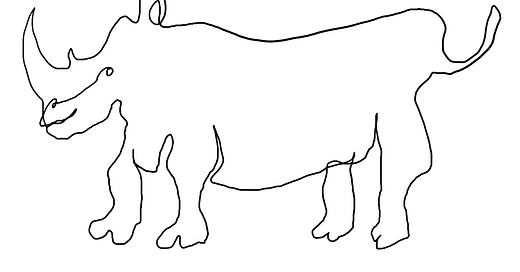The following letter was found, twisted into a tube, in an empty bottle of Pinot Noir (grapes harvested in the year 2022 from a vineyard in Santa Barbara county) that rolled onto my doorstep. Though I do not live near a body of water, the bottle was speckled with sand, rimed with the salt of the ocean, and smelled slightly of seaweed. I suspect it arrived here because of a thrashing storm. Gales and rabid, foamy waves carried the bottle—yes, perhaps even defying the laws of physics—all the way to my landlocked home. There it remained, clinking against my door, until I discovered it the next morning when I toed out onto the stoop, shod in my slippers and a striped terry cloth robe, to fetch the paper. Now that you know some of this letter’s strange journey, you may read it, and my response, for yourself.
To whomever stumbles upon this message,
It is a sad state of affairs here, in the country of A———. The arts have capitulated to the thrust of progress. No one reads, no one ponders. People only count. Count money, count likes, count the days until the end. Mounds of celluloid film burn in the city streets. Canisters holding Casablanca and Chinatown have been engulfed in flames. Books crumble under the weight of dust, locked away in a library of Babel whom no one visits (the library is scheduled to be bulldozed to make space for a shopping mall). Everyone believes in the completeness of their knowledge—nothing new can be learned. Art has been refashioned into what the government deems “utile”: the wood from the frames turned into chairs to support our ever-growing sedentary ways, the canvases wiped of their paint and shredded into stuffing for couch pillows.
If this message reaches someone, it may be too late. My soul may have already been ripped out of me. I hope the horizon is more promising in your land, wherever you are.
Yours,
Gaston1
Dear Gaston,
Things are not as bad over here—coincidentally, in country A———. Gaston. What an unusual name. Maybe we’ve met before: in the produce aisle, at the local racquet club, in the waiting room of the dentist’s.
Here’s what I can tell you: Experimentalism is dead. Our society has succumbed to the banal. The dreary, the gray. Eyes glazed over, reflecting the light of the screens that can no longer quell our moans of boredom. It’s a shame, I admit, though I cannot say I am surprised. Every movement dies. Postmodernism keeled over in the nineties, modernism before it. Not to speak of surrealism, absurdism, realism, romanticism, irons, aestheticism, post-post-modernism, anachronism (not to be confused with nostalgism). I am, of course, omitting all the philosophical, religious, and artistic -isms. In short, -isms seem unable to withstand time. Or else, we have a knack for bludgeoning them to death, always thirsty and impatient for the new, new, new (I refer, mainly, to material objects. Innovation on the page, as you will shortly read, is a boon, which we glaringly lack). A friend of mine in the Psycholiterary Department at Harvard—so you know his expertise can be trusted—anticipates that we are entering an era of Neo-Egoism. Though he tried to explain it to me, I’m afraid I missed many of the salient points (lateness of the evening, half-a-bottle of wine, and general mental fatigue can be to blame). But I’m sure you can parse out what it means.
The death of surrealism was a blow, yes, but not as great as the one I suffered by the death of experimentalism—news of which struck me in the chest as though launched from a cannon. Where is literature to go without the experimental? For a species so obsessed with progress, we have adopted a regressive stance towards the novel. Nearly a century ago, Joyce and Borges played with words and narrative in ways not seen on the page. Sterne did so 150 years before them; Pynchon and Wallace followed in their footsteps. How did we stray so far? Settling for conformity, convention, the bland. A stale loaf of white bread. This is the image left to us by experimentalism’s premature departure. I try to laugh at the irony of it: so attached are we to innovation in the realms that promise to ruin us (A.I., e.g.) and so afraid are we of it in the realms that satiate our spirits (i.e., the arts). What can we do? Perhaps we will wait and see how this Neo-Egoism unfolds. Do we have another choice?
In the unlikely event that this letter falls into your hands, please write back. I hope I have not soured the mood. Maybe circumstances will improve by the time we can talk again.
Warm regards,
D.
Upon rolling up my letter and slipping it back into the bottle, I drove to a nearby river, whose currents flow into the Atlantic, and hurled the repurposed Pinot Noir container into its waters. From the shore, I watched it bob towards its destination, until it bobbed out of sight.
Stay tuned for Experimentalism is Dead, Part II, where I’ll write about Borges, Pynchon, David Foster Wallace, Percival Everett, and many delicious ideas re: modern literature that have been swirling around this nebulous head of mine.
Courtesy of Donald Barthelme’s essay “Not-Knowing.”





